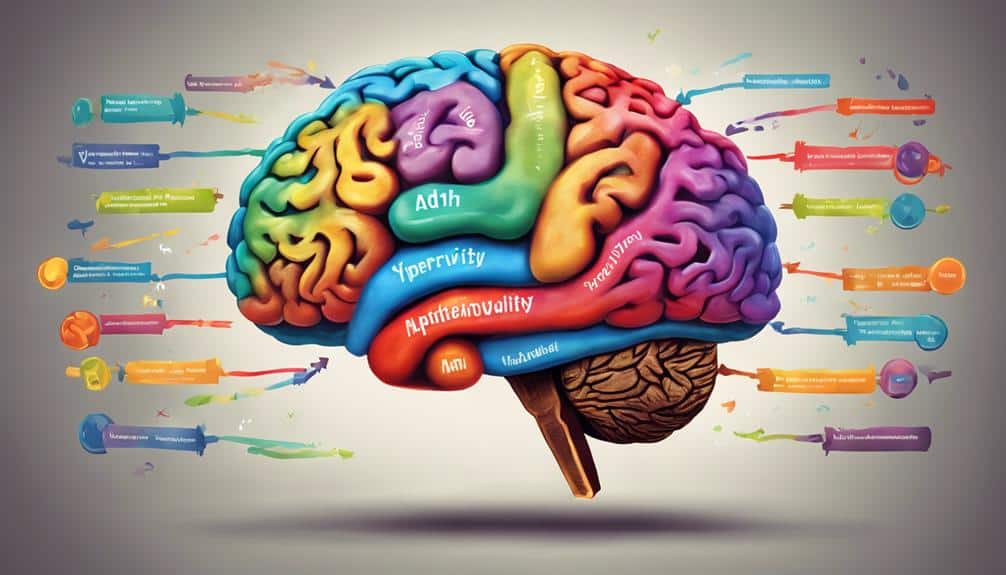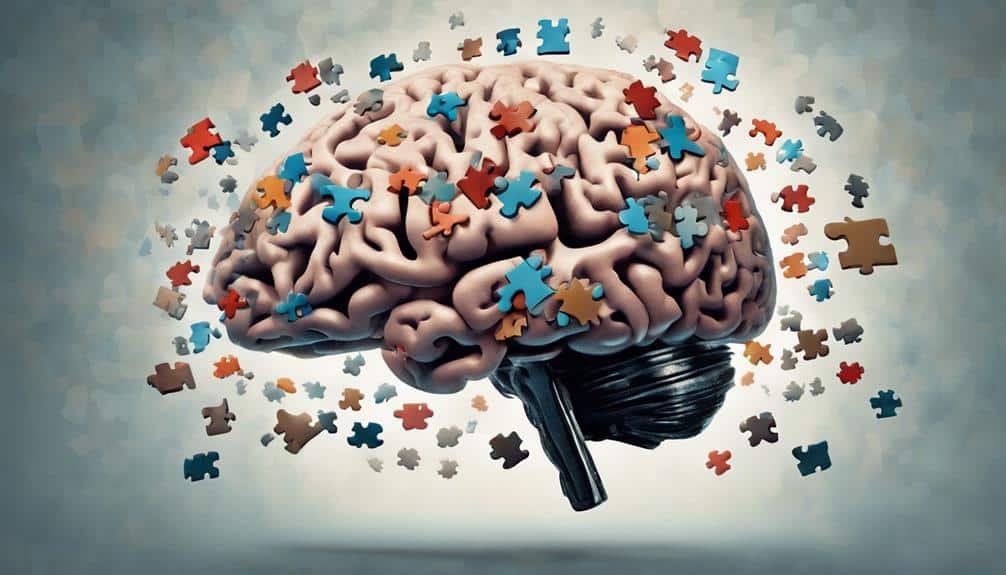Adhd Vocabulary
I recently came across a fascinating statistic that revealed how individuals with ADHD often struggle with grasping the extensive vocabulary associated with their condition. Understanding these terms is crucial for effective communication and management.
As I explore the intricate web of words surrounding ADHD, I can't help but ponder the impact that a thorough grasp of this vocabulary could have on improving the lives of those affected by the disorder.
Key Takeaways
- Understanding ADHD terminology is crucial for recognizing symptoms and accessing appropriate support.
- Coexisting conditions impact ADHD diagnosis and treatment, emphasizing the need for comprehensive care.
- Identifying symptoms like inattention, impulsivity, and hyperactivity helps target interventions effectively.
- Research and clinical trials play a vital role in advancing ADHD treatment and understanding coexisting conditions.
Common ADHD Terminology

In my clinical practice, I frequently encounter common ADHD terminology that's essential for understanding and managing Attention-Deficit/Hyperactivity Disorder. ADHD, a neurodevelopmental disorder, often manifests with challenges in executive function, which encompasses important cognitive skills such as planning, organization, and self-control. The DSM-V, the diagnostic manual utilized by clinicians, outlines the criteria for diagnosing ADHD based on specific symptoms and their duration.
ASRS, the Adult ADHD Self-Report Scale, serves as a valuable tool for self-assessment and initial screening for ADHD. Additionally, ADHD coaching plays a critical role in supporting individuals, particularly adults, in developing effective strategies for managing their symptoms. These coaching sessions focus on enhancing executive function skills to improve daily functioning and overall quality of life for individuals with ADHD.
Understanding these fundamental concepts and tools is essential for clinicians working with individuals with ADHD to provide thorough care and support tailored to their specific needs.
Understanding ADHD Symptoms

ADHD symptoms encompass inattentiveness, impulsivity, and hyperactivity, greatly impacting daily functioning. These manifestations can pose challenges in following instructions, organizing tasks, and maintaining focus, particularly in educational settings.
Understanding the common traits and how they affect daily life is important in recognizing and addressing ADHD in both children and adults.
Common ADHD Traits
With a deep understanding of common ADHD traits, one can better recognize and manage symptoms associated with the disorder.
- Inattention: Individuals with ADHD may find it challenging to focus on tasks for extended periods.
- Impulsivity: Quick decision-making without considering consequences is a common trait among those with ADHD.
- Hyperactivity: Restlessness and a constant need for movement are prominent features of ADHD.
- Organization and Time Management: Difficulties in organizing tasks and managing time efficiently can hinder completing tasks effectively.
Understanding these traits is important for identifying ADHD early and implementing appropriate support and interventions for improved daily functioning. The ability to address these symptoms can greatly enhance the quality of life for individuals with ADHD.
Impact on Daily Life
Recognizing the impact of ADHD symptoms on daily life is essential for understanding the challenges individuals face in various aspects of functioning.
Symptoms such as inattention can lead to forgetfulness, distractibility, and difficulties in task organization, affecting one's productivity at school or work.
Hyperactivity, characterized by excessive fidgeting and restlessness, can make it hard to sit still for extended periods, impacting task completion and focus.
Impulsivity in individuals with ADHD may result in challenges with decision-making and impulse control, affecting relationships and personal interactions.
These difficulties can contribute to lowered self-esteem and overall functioning in daily life.
Understanding how ADHD symptoms manifest in different areas allows for targeted interventions to improve daily functioning and quality of life.
Managing ADHD Challenges

Managing ADHD challenges involves implementing behavioral therapy to teach new coping strategies and improve behavior. To effectively manage ADHD symptoms, it's essential to develop a structured routine and set clear expectations. Here are some key strategies to help navigate the challenges of ADHD:
- Utilize Tools: Incorporate tools such as daily planners, timers, and visual schedules to organize tasks and maintain focus.
- Engage in Physical Activity: Regular exercise is fundamental in managing ADHD symptoms, as it helps improve focus and attention.
- Prioritize Sleep: Adequate sleep is vital for individuals with ADHD, as it can impact cognitive functions and overall well-being.
- Seek Support: Enlist the help of ADHD coaches, therapists, and support groups to gain valuable strategies and encouragement in managing ADHD challenges effectively.
Exploring ADHD Treatment Options

In exploring ADHD treatment options, it's essential to contemplate the benefits of medication, behavioral therapy, and lifestyle modifications.
Stimulant medications, such as methylphenidate and dextro-amphetamines, can help regulate neurotransmitter levels, while non-stimulant options offer alternatives with potentially fewer side effects.
Integrating behavioral therapy and making lifestyle changes can enhance the overall effectiveness of treatment for individuals with ADHD.
Medication for ADHD
Utilizing stimulant medications such as methylphenidate and dextro-amphetamines is a common approach in boosting dopamine and norepinephrine levels for treating ADHD. When considering medication for ADHD, options extend beyond stimulants, including non-stimulant alternatives for those with specific needs.
Introducing medication holidays, overseen by medical professionals, aids in evaluating the necessity of ongoing treatment. It's important to be aware of potential withdrawal effects, which may manifest as a rebound effect post-medication cessation, underscoring the importance of medical supervision throughout the treatment process.
Embracing a multimodal treatment strategy that integrates medication, therapy, and behavioral interventions provides a thorough approach to managing ADHD under expert medical guidance.
Behavioral Therapy Benefits
When considering treatment options for ADHD, behavioral therapy stands out as a pivotal strategy aimed at modifying behaviors and enhancing coping mechanisms. This evidence-based approach targets the core symptoms of ADHD, such as impulsivity and inattention, by helping individuals develop effective coping strategies and organizational skills.
By working to modify behaviors, behavioral therapy can greatly improve daily functioning and reduce the challenges associated with ADHD. It's particularly beneficial in addressing specific difficulties that individuals with ADHD may face in various settings.
Through a structured and targeted intervention plan, behavioral therapy aims to enhance overall functioning and quality of life for individuals with ADHD, providing them with essential tools to navigate their daily lives more effectively.
Lifestyle Changes Impact
Exploring the impact of lifestyle changes on ADHD treatment options reveals significant benefits in symptom management and overall well-being. When considering lifestyle modifications for ADHD, the following strategies can be particularly effective:
- Improving Sleep Quality and Diet: Enhancing sleep patterns and maintaining a balanced diet can positively influence ADHD symptoms.
- Regular Physical Exercise: Engaging in consistent physical activity has been proven to decrease hyperactivity and impulsivity in individuals with ADHD.
- Mindfulness Practices: Incorporating activities like meditation and yoga can aid in improving focus and attention for those with ADHD.
- Structured Routines and Organizational Tools: Establishing predictable routines and utilizing organizational aids can enhance time management and productivity, benefiting individuals with ADHD.
ADHD and Coexisting Conditions

Individuals with ADHD commonly exhibit coexisting conditions such as anxiety disorders, depression, and learning disabilities. Research indicates that up to 50-60% of individuals with ADHD have at least one coexisting condition. These additional conditions can complicate the diagnosis and treatment of ADHD, necessitating a thorough approach.
Coexisting conditions like autism spectrum disorder (ASD) and oppositional defiant disorder (ODD) often share symptoms with ADHD, making it challenging to distinguish between them.
Understanding and addressing coexisting conditions in individuals with ADHD is essential for complete care and management. A thorough evaluation to identify these conditions is essential for developing an effective treatment plan. Treatment may involve a combination of therapies tailored to each individual's specific needs.
ADHD Support and Resources

Exploring the landscape of ADHD support and resources requires a thorough understanding of available tools and organizations. When delving into this domain, one encounters a variety of resources and avenues for support:
- The CDC, Child Mind Institute, and National Institute of Mental Health furnish valuable statistics, symptoms, and treatment information for ADHD.
- Organizations like the American Academy of Child and Adolescent Psychiatry and CHADD extend advocacy efforts, toolkits, and support for individuals grappling with ADHD.
- Resources such as the ADHD Coaches Organization and Theravive network aid in locating ADHD specialists and mental health professionals.
- ClinicalTrials.gov and CenterWatch serve as platforms for identifying clinical trials related to ADHD research and participation.
Understanding the terminology associated with ADHD, including terms like ADD, ADHD coaching, and behavior therapy, is essential for effectively exploring the landscape of ADHD support and resources. These avenues offer essential assistance in the diagnosis, treatment, and management of ADHD, underscoring the importance of seeking out support systems and resources in the domain of mental health advocacy.
Frequently Asked Questions
Does ADHD Affect Vocabulary?
Yes, ADHD can impact vocabulary development and communication skills. Symptoms like inattention and impulsivity may affect language processing. Tailored interventions can support cognitive function and language therapy to address communication difficulties and enhance expressive and receptive language abilities.
What Words Are Associated With Adhd?
Having ADHD impacts my communication by affecting cognitive linguistic skills, causing verbal fluency challenges, vocabulary development issues, and language processing difficulties. I struggle with word retrieval, face communication barriers, linguistic deficits, and require speech language therapy interventions.
Does ADHD Make It Hard to Find Words?
Yes, ADHD can make it difficult to find words due to word retrieval challenges. Communication struggles, cognitive processing delays, and expressive language difficulties are common. Verbal fluency issues, vocabulary recall problems, and linguistic processing hurdles also occur.
What Are Language Characteristics of Adhd?
Communication challenges in ADHD impact expressive language, social interactions, and cognitive processing. Linguistic development may show delays, requiring speech therapy. Word retrieval, phonological awareness, and pragmatic difficulties are common, affecting overall language abilities.
Conclusion
To sum up, exploring the world of ADHD can be overwhelming, but understanding the vocabulary is key to effectively managing this complex disorder.
By familiarizing oneself with terms like DSM-V, co-morbidity, and FAPE, individuals with ADHD can better advocate for themselves and access the resources and support they need.
Remember, knowledge is power when it comes to addressing the challenges of ADHD. Stay informed, stay empowered, and take control of your journey towards a brighter future.







